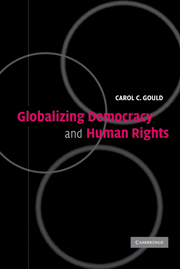Crossref Citations
This Book has been
cited by the following publications. This list is generated based on data provided by Crossref.
2004.
Recent Publications.
Women's Studies,
Vol. 34,
Issue. 1,
p.
109.
van den Anker, Christien
2005.
Cosmopolitan Justice and the Globalization of Capitalism: The UNDP and ILO Proposals.
Globalizations,
Vol. 2,
Issue. 2,
p.
254.
Cardenas, Sonia
2005.
Constructing Rights? Human Rights Education and the State.
International Political Science Review,
Vol. 26,
Issue. 4,
p.
363.
Kruks, Sonia
2006.
‘Spaces of Freedom’: Materiality, Mediation and Direct Political Participation in the Work of Arendt and Sartre.
Contemporary Political Theory,
Vol. 5,
Issue. 4,
p.
469.
el-Ojeili, Chamsy
and
Hayden, Patrick
2006.
Critical Theories of Globalization.
p.
89.
Warren, Mark E.
2006.
What Should and Should Not Be Said: Deliberating Sensitive Issues.
Journal of Social Philosophy,
Vol. 37,
Issue. 2,
p.
163.
Gould, Carol C.
2007.
Coercion, Care, and Corporations: Omissions and Commissions in Thomas Pogge's Political Philosophy.
Journal of Global Ethics,
Vol. 3,
Issue. 3,
p.
381.
Nash, Kate
2007.
The Pinochet case: cosmopolitanism and intermestic human rights1.
The British Journal of Sociology,
Vol. 58,
Issue. 3,
p.
417.
Langlois, Anthony J.
2007.
Human Rights and Cosmopolitan Liberalism.
Critical Review of International Social and Political Philosophy,
Vol. 10,
Issue. 1,
p.
29.
Crocker, David A.
2007.
Deliberative Participation in Local Development.
Journal of Human Development,
Vol. 8,
Issue. 3,
p.
431.
Reilly, Niamh
2007.
Cosmopolitan Feminism and Human Rights.
Hypatia: A Journal of Feminist Philosophy,
Vol. 22,
Issue. 4,
p.
180.
Reilly, Niamh
2007.
Cosmopolitan Feminism and Human Rights.
Hypatia,
Vol. 22,
Issue. 4,
p.
180.
Urbinati, Nadia
and
Warren, Mark E.
2008.
The Concept of Representation in Contemporary Democratic Theory.
Annual Review of Political Science,
Vol. 11,
Issue. 1,
p.
387.
Tinnevelt, Ronald
and
Schutter, Helder De
2008.
Global justice as justice for a world of largely independent nations? From dualism to a multi‐level ethical position.
Critical Review of International Social and Political Philosophy,
Vol. 11,
Issue. 4,
p.
519.
Langlois, Anthony J.
2008.
Charity and Justice in Global Poverty Relief.
Australian Journal of Political Science,
Vol. 43,
Issue. 4,
p.
685.
Robinson, Fiona
2008.
The Importance of Care in the Theory and Practice of Human Security.
Journal of International Political Theory,
Vol. 4,
Issue. 2,
p.
167.
Gould, Carol C.
2008.
Coercion and the State.
p.
189.
Ruppert, Uta
2008.
Handbuch Frauen- und Geschlechterforschung.
p.
908.
Widdows, Heather
2009.
Between the individual and the community: the impact of genetics on ethical models.
New Genetics and Society,
Vol. 28,
Issue. 2,
p.
173.
Crocker, David A.
2009.
El ciudadano democrático.
p.
47.





